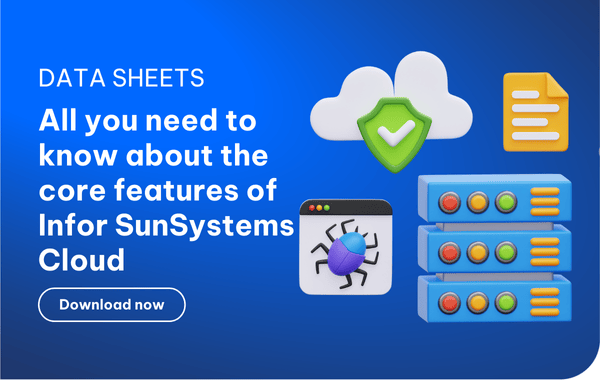The role of CFOs today has evolved significantly, becoming more dynamic and responsive to changing demands from internal stakeholders and external customers. The modern CFO is now involved in strategy creation and business transformation initiatives, acting as a strategic advisor to the CEO and the rest of the C-suite.
Thus, CFOS must be equipped with timely, relevant insights as well as modern tools that enable them to make informed decisions even on the go. So how do they juggle all those strategic tasks while also keeping a safe haven for the entire business' financial and highly confidential data?
Read more: Why CFOs should be looking to the Cloud

Content
- Digital CFOs and digital transformation in finance
- Factors impacting the CFO’s changing role
- How Infor SunSystems empowers CFOs and their finance functions
Digital CFOs and digital transformation in finance
The role of CFOs has evolved significantly in the last several years and will continue well into the future. They are no longer stuck to the typical traditional duty of managing the company's finances but have evolved to take on more strategic initiatives alongside other members of the C-suite. Modern CFOs today are transforming into digital CFOs.
Read more: 7 Worst Financial Fiascos Caused by Excel Errors
Contrary to popular belief, digital transformation is as finance-driven as it is technology-driven. In fact, the CFO’s role and vision in the entire digital journey are highly critical. A digital CFO will be responsible for evaluating the cost-effectiveness and adding value to the digital processes, thus helping to expand the organisation's scale.
In addition to taking on new responsibilities, modern CFOs need to learn how to fully utilise data to grasp emerging opportunities and get involved in strategy planning and decision-making. Given that new technology, along with changes in people and processes, broadly enables the shift from conventional to digital operations, it is inevitable for businesses to do so over time.
It is important to note that CFOs should be positioned at the centre of the digital transformation process. With new technologies fundamentally changing how businesses manage their finances, CFOs’ concerns are shifting from simple budget planning to ROI and cost-effectiveness analysis. Analytics and reporting functions also contribute to changing financial responsibilities.
Read more: Navigating Challenges: the Worrying State of Digital Transformation for SMEs
This shift in financial responsibilities is prompting a change in mindset. The view of finance as a backend support function requiring minimal IT investment is outdated. CFOs who guide organisational financing must adapt to technological evolution.
To reinforce their reinvented role aligned with broader strategies, CFOs leverage digital tools to provide deep analysis and insights. However, each CFO faces unique challenges based on their organisation. Therefore, having a foresighted digital transformation plan prepares CFOs to lead their organisation successfully in this new digital age.
Read more: Digital Transformation - a 7-Step Road Map for Success
Factors impacting the CFO’s changing role
Today’s CFO needs to be a strategist, a transformer, a technology specialist, as well as the ultimate steward and leader of finance operations in the business. Recognising the necessity of digital transformation, CFOs should adopt different ways of thinking and operating, as the business world has already revolved around technology.
Volatility
Businesses today face a constant stream of volatility, whether it be in the form of macroeconomic shifts or changes in the geographical landscape. These fluctuations can have a significant impact on exchange rates and ultimately affect a business's income.
However, the finance team often finds itself tied up in the day-to-day operations of recording transactions and closing the books, leaving little time to react to these industry changes.
The traditional methods of financing are ill-equipped to meet the strategic needs of a business in such a volatile environment. They fail to adequately assess risks, respond to market volatility, and most importantly, develop innovative strategies to capitalise on new opportunities and create new business models.
It is crucial for businesses to adapt and embrace new approaches to finance in order to thrive in this ever-changing landscape.
Read more: Overcome Reporting Challenges of On-Premises Systems for the C-Suite
The new generation of finance users
The expectations and preferences of modern users have changed significantly. It used to be a major challenge for professionals to adapt to the complex accounting and finance software required to perform their tasks efficiently, thus hindering their overall productivity.
However, the younger generations, such as Millennials and Generation Z, have brought about a refreshing shift in this dynamic. These tech-savvy individuals have grown up in a world surrounded by advanced technologies, and as a result, they have a natural affinity for high-tech applications and tools. They are accustomed to intuitive user interfaces and seamless user experiences and have little patience for outdated or convoluted systems.
As the new generation enters the workforce, they are bringing with them a demand for user-friendly and intuitive software solutions.
Read more: Solving 5 Common Accounts Payable Issues with Automation
CFOs and finance professionals must recognise the changing landscape and adapt accordingly. They need to embrace technology that not only meets the demands of the younger generation but also enhances their own productivity and effectiveness.
By leveraging digital tools and platforms that offer intuitive interfaces, simplified processes, and real-time data analysis capabilities, CFOs can empower themselves and their teams to work more efficiently and make informed decisions.
Functional silos
In any organisation, the presence of functional silos is inevitable. These silos occur when different departments or teams within the company operate independently without collaborating or sharing information. Instead of working together towards a common goal, each team focuses on their own goals and agendas.
How does this impact CFOs? The presence of segregated and siloed information forces CFOs to navigate a complex web of individual systems to find the necessary data and piece it all together to create a meaningful representation. However, by the time this representation is complete, the insights may no longer be accurate or up-to-date.
Furthermore, operating in isolated departments not only hinders cohesiveness and communication but also diminishes productivity, leads to redundant work, and results in inconsistent business reporting and analytics.
Given the intricate nature of the CFO's role and their increased strategic responsibilities, they must have access to a centralised and reliable source of information that they can quickly retrieve. Relying on manual methods of gathering data will only serve as a hindrance and eventually overwhelm them.
Read more: Networked Analytics - the Next Wave of Business Intelligence
Access to capital
Capital is a scarce resource within organisations, and the competition to secure it can be fierce. To optimise the allocation of capital and maximise returns, it is worth considering a shift from a traditional capital-based spending model to a revenue-based spending model.
A capital-based spending model typically relies on return on investment calculations to determine how capital is allocated within an organisation. While this approach has its merits, it may not always be the most effective or efficient way to drive growth and generate revenue.
The revenue-based spending model, on the other hand, allows organisations to prioritise investments that have the potential to generate immediate and sustainable revenue streams. This approach takes into account factors such as market demand, customer preferences, and the competitive landscape, allowing organisations to make more informed decisions about where to allocate their capital.
Furthermore, a revenue-based spending model encourages a more agile and adaptable approach to capital allocation. Instead of committing large sums of capital upfront, organisations can adopt a more iterative and flexible approach, testing new ideas and strategies on a smaller scale before scaling up investments.
It is important to note that transitioning to a revenue-based spending model requires a shift in mindset and a cultural change within the organisation, for instance, breaking down silos between departments and fostering a collaborative and innovative work environment.
Technical debt
Many companies face challenges when it comes to updating and maintaining their internal finance systems, particularly if these systems are installed on-premise. Not only do they require significant upfront investment costs for physical facilities, but they also demand human resources to ensure their maintenance, protection, and upgrades.
Businesses can consider collaborating with a specialised cloud-based Software-as-a-Service (SaaS) provider to lighten this load. By entrusting the management and maintenance of their finance systems to a reliable SaaS provider, CFOs can concentrate on their core responsibilities and strategic initiatives without the added burden of technology management.
Furthermore, numerous SaaS solutions now offer built-in business intelligence and analytics tools, enabling CFOs and their finance teams to gain valuable insights through interactive dashboards and effortlessly create their own reports with just a few clicks of the mouse.
Read more: Exploring Financial Management Solutions: An Overview of 6 Leading Software
How Infor SunSystems empowers CFOs and their finance functions
Transitioning from traditional financial management processes can be a bold and transformative move for organizations. While digital transformation is not, the global pandemic has accelerated its adoption worldwide.
CFOs have a wide range of cloud options to consider when embarking on their finance function's digital transformation journey. One standout solution is SaaS software, which offers numerous benefits beyond cost savings.
If you are interested in learning more about the fundamentals of cloud computing, check out our additional resources here. Alternatively, you can learn more specifically about SaaS accounting software by clicking here.
So, how does this relate to TRG International's SaaS financial management solution, Infor SunSystems Cloud?
Infor SunSystems Cloud is the latest iteration of the trusted financial management solution, SunSystems, from Infor. With over four decades of success, SunSystems has become the go-to choice for businesses across industries worldwide.
The solution incorporates essential features that address potential roadblocks you may encounter along the way.
- A true SaaS financial management solution that provides a next-gen cloud operating system, integration capabilities, security, scalability, international support, multi-language, and multi-currency on top of the core financials
- Being a true SaaS also means companies can significantly save on upfront investments, shifting from the CAPEX-heavy expenditure to a more predictable OPEX pricing model.
- New updates are released monthly and are managed by a team of highly qualified experts. No more "technical debt" weight.
- A completely integrated system that is capable of extending beyond the core financials to include enterprise performance management, reporting, banking solutions, and more to make a highly comprehensive and industry-specific financial management suite
- Collaboration tools for social business via Infor Ming.le. By enabling efficient departmental communication and collaboration, you can eliminate departmental silos.
Explore the comprehensive features of SunSystems Cloud and gain a deeper understanding of its core financial modules. Discover more insights and details in our exclusive information kit provided below.
Don't miss out! Download the kit today and unlock the potential of SunSystems Cloud for your business!
 English
English  Vietnamese
Vietnamese 



